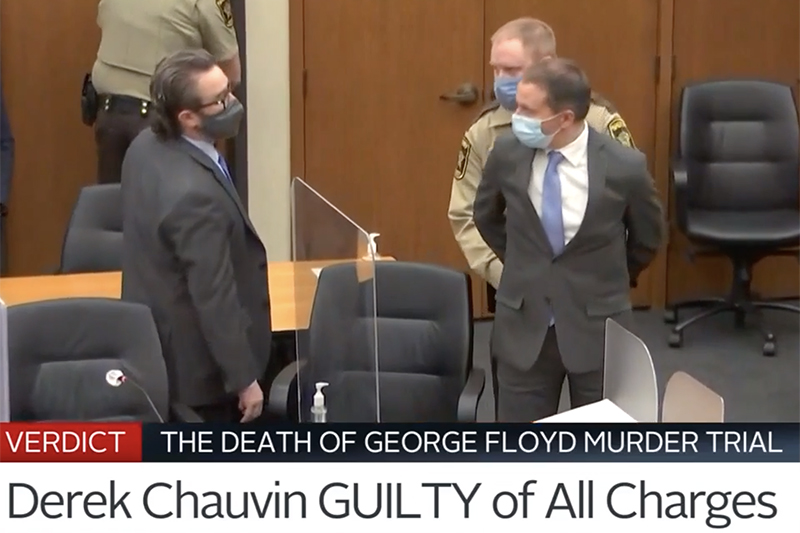The guilty verdict in the trial of Derek Chauvin for the killing of George Floyd signposts a defining moment beyond policing. Finding Chauvin guilty on all counts should have consequences for policing in the United States, the trial-by-jury system and, crucially, race and justice.
Every incident of excessive use of force puts officers at risk and generates further harm for communities.
Although only about 1.5% of police-citizen encounters results in use of any kind of force, a 2019 study finds that one out of 1,000 Black men in America “can expect to be killed by police.”
A level of force is needed for police work, but excessive use of force makes policing more dangerous. Every incident of excessive use of force puts officers at risk and generates further harm for communities.
Keeping trigger-happy officers on the streets is a tragedy waiting to happen and a major disservice to police organizations. Refusal to ensure meaningful consequences in cases of excessive force destroys the trust between communities and the police.
Accountability in policing
The prosecution was wise to emphasize in its closing remarks that Chauvin’s trial was “pro-police” and not “anti-police.”
The idea that any attempt to ensure accountability or discipline regarding excessive use of force is anti-police ultimately harms policing as an occupation. Unfortunately, this is a widespread sentiment in the population. It is worse in racially charged cases such as Chauvin’s.
Police officers are rarely charged for excessive use of force and, when charged, their conviction rates are significantly lower than those of civilians.
Police officers ought to be held to the same standards as everyone else. Prompt handling of disciplinary issues with meaningful sanctions – instead of paid leaves – is also necessary.
Japan versus the United States
The trial-by-jury system in the US can no longer be considered objectively rational given the outcomes of cases involving overwhelming televisual evidence. Jurors share the sentiments, biases and proclivities of society.
A majority of the six lay judges, and at least one professional judge, are required to pass judgment. This avoids the tyranny of a single individual who can effectively block a verdict or cause a hung jury, especially in politically charged cases.
These issues are particularly reflected in cases involving police. The case of Black Minnesota police officer Mohamed Noor, convicted in 2019 for killing a white Australian woman, provides an interesting backdrop to the colour of justice in America.
The state of Missouri has issued more federal death penalties than New York, California and Florida combined. Most of Missouri’s death penalty convictions were in predominantly white suburban counties with high concentrations of minorities.
In contrast, a death penalty conviction in the District of Columbia, Puerto Rico and the Southern District of New York – which have majority non-white populations – appears to be an insurmountable challenge. In other words, whether you receive the death penalty depends on who you are and where your crime was committed.
Japan, where 98.1% of the people are ethnically Japanese, has a more sophisticated trial by jury system than the U.S., which has a greater ethnoreligious diversity.
Japan reintroduced a trial-by-jury system in 2009 after ending it in 1943. Up to six “lay judges” and three professional judges decide serious cases.
A majority of the six lay judges, and at least one professional judge, are required to pass judgment. This avoids the tyranny of a single individual who can effectively block a verdict or cause a hung jury, especially in politically charged cases.
Broken systems
The increasing prevalence of neo-Nazi sympathies and supremacist views in policing should be a cause of concern. Some serving police officers participated in the 6 January insurrection at the US Capitol.
Chauvin should never have been a cop. The 17 disciplinary cases he had ratcheted up should have led to his exit from police service long before 25 May, 2020.
These issues call for a sober reflection about whom we are recruiting into policing. Police reforms need to ensure that excitable, irritable and the authoritarian personality kinds are disqualified from entry.
There have long been concerns that policing and the entire criminal justice system are functioning in exactly the way they were designed.
Police officers are recruited from society. Therefore, their conduct – for better or worse – reflects the norms, values and ideological claims of society. Chauvin is an embodiment of a fundamentally broken system – and arguably its most notorious symbol since the 1991 beating of Rodney King.
Chauvin should never have been a cop. The 17 disciplinary cases he had ratcheted up should have led to his exit from police service long before 25 May, 2020.
Chauvin is not the system. The system that produced him is still there across the landscape. That needs to change before another Chauvin emerges.
This article is republished from The Conversation under a Creative Commons license. Read the original article here.
Picture © CourtTV



It is difficult given the current state of American society, let alone in politics, to see ‘reform’ happening. Not only are politics divided at the national, federal level in many states and cities etc there are majorities for those most likely to vote ‘no’ to reform.
Add in racial and ethnic factors and it is hard to see that there is a consensus for reform. For many Americans, not just white people, the problem is in the inner city or the “other side of the tracks”. Just as long as the perceived problem stays there it is “out of sight and out of mind”. Nor should one overlook the power of the police benevolent associations, which have a history of successfully resisting reforms.
Yes, the ‘system’ needs to change, that does not mean change cannot happen. It could be at city level, possibly in a few states and one day even at the federal level.